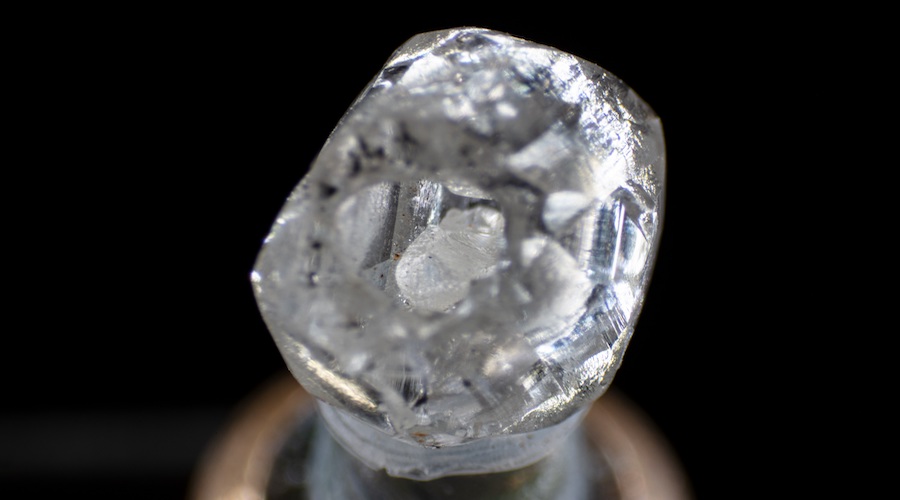GEMOLOGY
De Beers finds diamond within a diamond, names it the “Beating Heart”
Cecilia Jamasmie | April 6, 2023 |

Optical image showing the small diamond crystal nestled in the cavity of the 0.33ct rough diamond. (Photo: Danny Bowler | De Beers Institute of Diamonds.)
De Beers, the largest diamond producer by value, has unveiled a unique piece it named the “Beating Heart”, a 0.33-carat rough specimen that consists of a diamond within another diamond.

The unusual discovery – a D-colour, type IaAB diamond – has an internal cavity enclosing a smaller loose diamond, which is trapped, yet free to move around within the space.
De Beers said the gemstone was discovered at one of its mines in either Africa or Canada, but the exact origins can’t be pinpointed.
It arrived at the De Beers Institute of Diamonds facility in Maidenhead, England, in November last year, where it was verified to be a natural occurring stone.
Initial conclusions from the Institute’s experts suggest that an intermediate layer of poor-quality diamond etched away during its travel to the surface of the Earth, leaving only the better-quality material: the outer diamond and the core.
“The ‘Beating Heart’ is a remarkable example of what can happen on the natural diamond journey from formation to discovery,” Jamie Clark, Head of Global Operations at De Beers Institute of Diamonds, said in the statement
.

The “Beating Heart” will not be cut and polished and will instead be kept for research and educational purposes. (Image courtesy of De Beers Institute of Diamonds.)
Now registered on De Beers’ Tracr blockchain platform, which certifies a diamond’s provenance and production journey, the “Beating Heart” will be kept in its rough form for research and educational purposes.
Competitor Alrosa found a similar diamond in 2019, which was named “Matryoshka” after the famous Russian nesting dolls. The 0.62 carat gem, estimated to be over 800 million years old, resulted from one diamond growing inside another, according to Alrosa’s scientists.
Now registered on De Beers’ Tracr blockchain platform, which certifies a diamond’s provenance and production journey, the “Beating Heart” will be kept in its rough form for research and educational purposes.
Competitor Alrosa found a similar diamond in 2019, which was named “Matryoshka” after the famous Russian nesting dolls. The 0.62 carat gem, estimated to be over 800 million years old, resulted from one diamond growing inside another, according to Alrosa’s scientists.
No comments:
Post a Comment